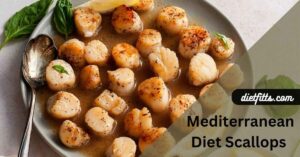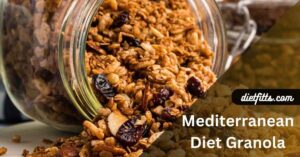Can You Have Bacon On The Mediterranean Diet – Explore Burning Facts!
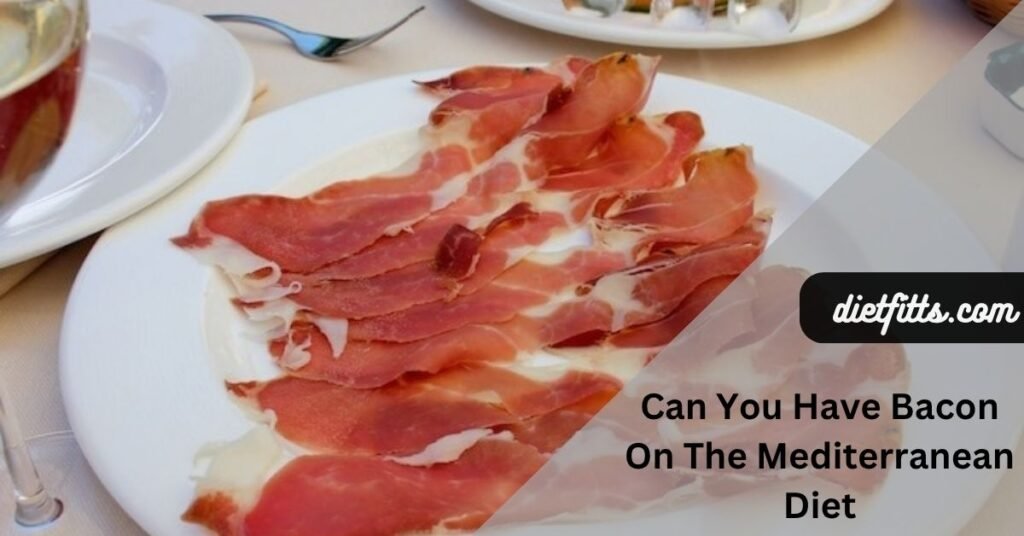
No, you shouldn’t eat processed meats like sausages and bacon, along with refined grains, sugary drinks, and packaged snacks. These foods aren’t good for your health. By sticking to this diet, you’ll see improvements like a healthier heart and sharper thinking.
If you’re looking for “Can You Have Bacon On The Mediterranean Diet”? Worry not, An ultimate guide is mentioned right below. So, let’s get started
Table of Contents:
What Is Mediterranean Diet? – Understand Its Myths!
Before we talk about bacon in the Mediterranean diet, let’s understand what this diet is about. The Mediterranean diet isn’t just a diet plan; it’s a way of eating based on how people around the Mediterranean Sea traditionally eat. The Mediterranean diet emphasizes plant-based foods such as:
- Fruits
- Veggies
- Whole grains
- Legumes
- Nuts & seeds
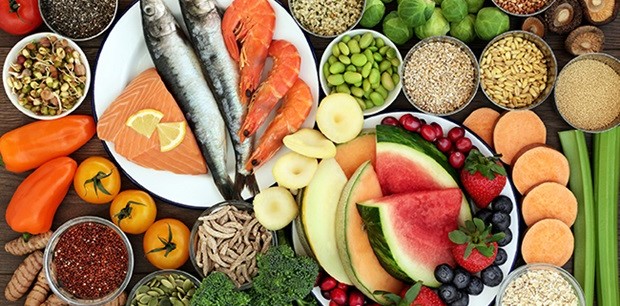
These foods offer a lot of vitamins, minerals, fiber, and phytonutrients. Olive oil is the main fat used, and it’s full of healthy monounsaturated fats and polyphenols. These are thought to help with inflammation and heart health.
Alongside plant-based foods, the Mediterranean diet includes fish and poultry in moderation, while limiting red meat and dairy. Fatty fish such as salmon, mackerel, and sardines are packed with omega-3 fatty acids, which help reduce the risk of heart disease. Poultry such as chicken and turkey offer lean protein without the saturated fat found in red meat.
Can You Have Bacon On The Mediterranean Diet – Pros And Cons!
Now, let’s talk about bacon, a classic breakfast favourite and a key ingredient in many recipes. Bacon is pork cured with salt, usually from the belly or back of the pig. It’s famous for its tasty, savoury flavour and crunchy texture, which can make dishes more flavorful and satisfying.

Despite being popular, bacon has drawn significant attention from health experts and researchers due to its nutritional content and potential health effects. A big worry about bacon is its high levels of saturated fat and sodium, which are linked to major issues like:
- Heart disease
- Stroke
Bacon also falls under the category of processed meat, along with sausages, ham, and deli meats, which are associated with a higher risk of certain cancers, like colorectal cancer, and other health problems.
A study published in BMJ found that consistently consuming red meat, particularly processed types, was linked to an elevated risk of mortality.

Finally, You have learned about the Mediterranean diet and some pros and cons of bacon. Now, I am going to show some nutritional profiles of bacon and Its various potential health risks. To read people’s discussions worldwide, visit this Quora website.
Nutritional Profile Of Bacon – Have A Look!
To understand how bacon fits into the Mediterranean diet, let’s examine its nutritional content. A usual serving of bacon, roughly three slices or 1 ounce (28 grams), contains approximately:
| Nutrient | Amount |
| Calories | 161 kcal |
| Total Fat | 12 g |
| Saturated Fat | 4 g |
| Cholesterol | 37 mg |
| Sodium | 573 mg |
| Protein | 12 g |
As you can see, bacon is relatively high in calories and fat, with a significant portion of its fat content coming from saturated fat. I advise you that it is better not to consume bacon because it can raise your LDL cholesterol level. This bad cholesterol contributes to the development of atherosclerosis and cardiovascular disease.
Read Also: Is Sushi On The Mediterranean Diet – Guide In 2024!
Additionally, bacon is high in sodium, primarily due to the salt used in its curing and preservation process. Excessive sodium intake has been linked to high blood pressure, fluid retention, and an increased risk of heart disease and stroke.
Potential Health Risks Of Bacon Consumption – Must Consider Third One!
1. Increased Risk of Heart Disease: The high saturated fat content in bacon can contribute to elevated LDL cholesterol levels, a significant risk factor for heart disease. Diets high in saturated fat have been associated with an increased risk of coronary artery disease, heart attack, and stroke.
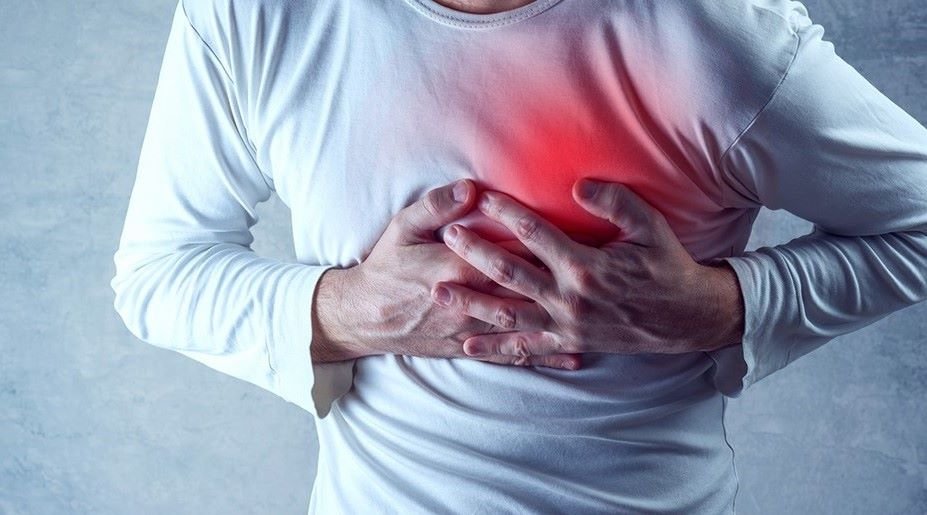
2. Elevated Blood Pressure: The high sodium content in bacon can lead to elevated blood pressure, especially in individuals who are sensitive to sodium. High blood pressure significantly increases the risk of heart disease, stroke, and kidney disease.
3. Risk of Colorectal Cancer: Bacon and other processed meats are known to cause cancer. They’re classified as Group 1 carcinogens by experts. Eating these meats, like bacon, increases the risk of getting colorectal cancer, which is a common and dangerous type of cancer worldwide.
4. Weight Gain and Obesity: Bacon is rich in calories and can lead to consuming too many calories if eaten regularly, especially in large amounts or as part of high-calorie meals. However, eating too many calories can result in diseases like:
- Weight gain
- Obesity
- Type 2 diabetes
- Fatty liver

The main misconception is the amount of meat people think they can have on the Mediterranean diet. As a dietitian, I suggest that 90-95% of your meals should be plant-based if you’re following this diet.
I recommend eating fish or poultry only twice a week and red meat just a few times per month. While many Mediterranean diet recipes include chicken, turkey, or beef, it’s important to remember that this diet is mainly vegetarian.
Read Also: Mayonnaise Mediterranean Diet – Transform Your Diet!
How To Incorporate Bacon Into A Mediterranean-Style Meal – Tips For You!
1. Choose High-Quality Bacon: Pick nitrate-free bacon from pasture-raised or organic pigs. Avoid added preservatives or artificial flavours.

2. Limit Portion Sizes: Practice portion control when serving bacon to keep calorie and fat intake in check. Serve smaller portions, like one or two slices, to manage calorie intake.
3. Pair with Nutrient-Rich Foods: Combine bacon with colourful fruits, veggies, whole grains, and legumes for added nutrients and fiber.
4. Use as a Flavor Enhancer: Instead of making bacon the star of the dish, use it as a flavour enhancer. Crumble crispy bacon over salads, soups, or vegetable side dishes for added texture and savoury flavour without relying on it as the main protein source.
Must Read It: What Foods Are Not Allowed On Mediterranean Diet – Guide In 2024!
5. Combine with Lean Proteins: When preparing meals that include bacon, balance it with lean protein sources like fish, poultry, or plant-based proteins. Pairing bacon with lean proteins helps to offset its high saturated fat content and adds variety to your meal.

6. Incorporate Mindful Cooking Techniques: Use cooking methods that minimize the need for added fats and oils when preparing bacon. Instead of frying bacon in oil or butter, opt for baking, grilling, or air-frying methods to reduce added fat and calories.
7. Include Heart-Healthy Ingredients: Complement bacon with heart-healthy ingredients like olive oil, nuts, seeds, and avocado to boost the nutritional profile of your meal. These ingredients provide beneficial monounsaturated fats, antioxidants, and fiber that support cardiovascular health and overall well-being.
Frequently Asked Questions:
1. Can I have turkey bacon on a Mediterranean diet?
In this diet, you’ll avoid processed meats like sausages and bacon, as well as refined grains, sugary drinks, and packaged snacks. These foods can harm your health. By sticking to this diet, you’ll experience benefits like a healthier heart and improved cognitive function.
2. What meats are on a Mediterranean diet?
The Mediterranean diet revolves around plant-based foods like vegetables, fruits, herbs, nuts, beans, and whole grains. It contains reasonable portions of dairy, poultry, eggs, and seafood. However, red meat is only consumed occasionally.
3. Is Mayo Allowed on the Mediterranean Diet?
Mayonnaise isn’t part of the Mediterranean diet because it’s processed and has unhealthy vegetable fats. Instead, try using Greek yoghurt or avocados in your sandwiches. They’re equally delicious but way healthier.
Conclusion:
No, processed meats like sausages and bacon aren’t part of the Mediterranean diet. This diet focuses on plant-based foods like fruits, veggies, whole grains, nuts, and seeds. You can use moderate amounts of dairy, poultry, eggs, and seafood.
Red meat is only eaten occasionally. These changes can lead to a healthier heart and sharper thinking.

Hi! I’m Olivia Steeve, a certified nutritionist with over 11 years of experience in the field of diet and nutrition. At DietFitts, I focus on providing scientifically-backed, practical advice to help individuals achieve their health and fitness goals through balanced eating. I share insights, tips, and personalized guidance to help you make healthier choices and live your best life.

